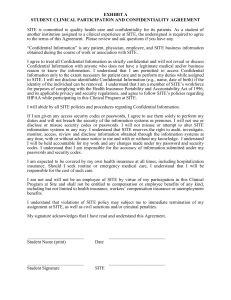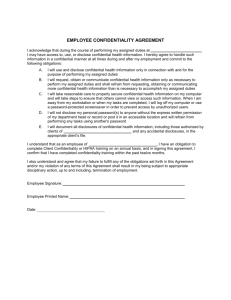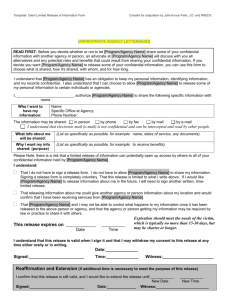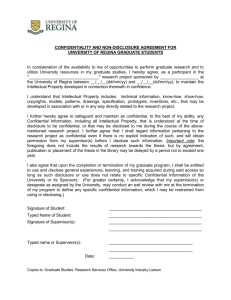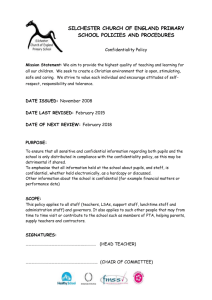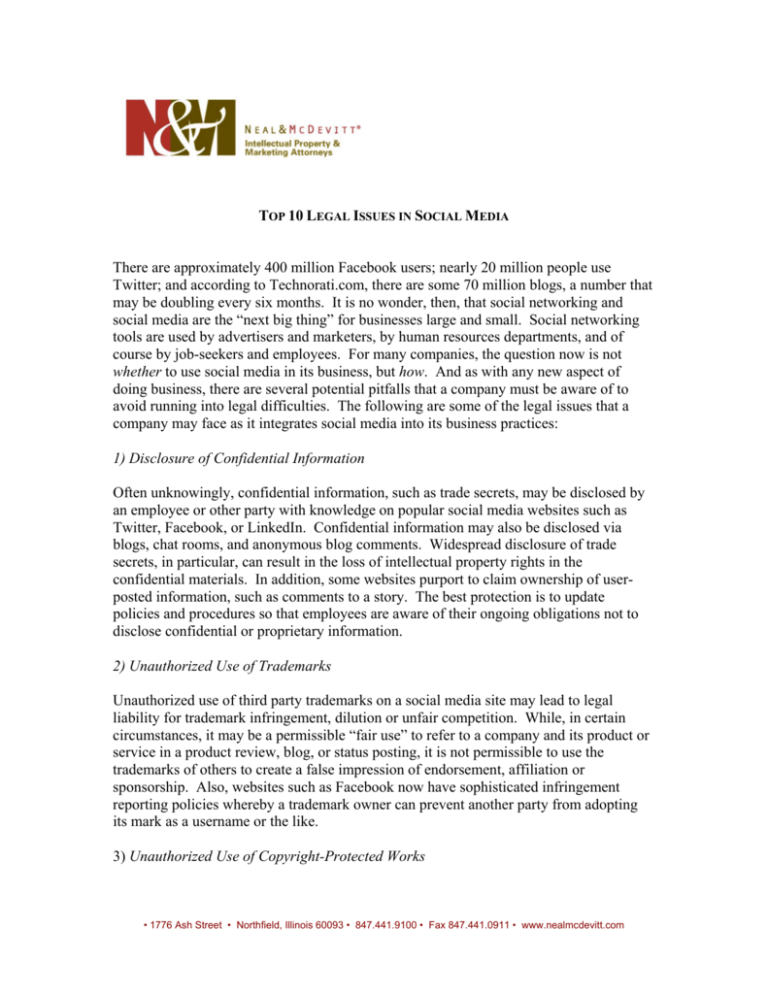
TOP 10 LEGAL ISSUES IN SOCIAL MEDIA
There are approximately 400 million Facebook users; nearly 20 million people use
Twitter; and according to Technorati.com, there are some 70 million blogs, a number that
may be doubling every six months. It is no wonder, then, that social networking and
social media are the “next big thing” for businesses large and small. Social networking
tools are used by advertisers and marketers, by human resources departments, and of
course by job-seekers and employees. For many companies, the question now is not
whether to use social media in its business, but how. And as with any new aspect of
doing business, there are several potential pitfalls that a company must be aware of to
avoid running into legal difficulties. The following are some of the legal issues that a
company may face as it integrates social media into its business practices:
1) Disclosure of Confidential Information
Often unknowingly, confidential information, such as trade secrets, may be disclosed by
an employee or other party with knowledge on popular social media websites such as
Twitter, Facebook, or LinkedIn. Confidential information may also be disclosed via
blogs, chat rooms, and anonymous blog comments. Widespread disclosure of trade
secrets, in particular, can result in the loss of intellectual property rights in the
confidential materials. In addition, some websites purport to claim ownership of userposted information, such as comments to a story. The best protection is to update
policies and procedures so that employees are aware of their ongoing obligations not to
disclose confidential or proprietary information.
2) Unauthorized Use of Trademarks
Unauthorized use of third party trademarks on a social media site may lead to legal
liability for trademark infringement, dilution or unfair competition. While, in certain
circumstances, it may be a permissible “fair use” to refer to a company and its product or
service in a product review, blog, or status posting, it is not permissible to use the
trademarks of others to create a false impression of endorsement, affiliation or
sponsorship. Also, websites such as Facebook now have sophisticated infringement
reporting policies whereby a trademark owner can prevent another party from adopting
its mark as a username or the like.
3) Unauthorized Use of Copyright-Protected Works
• 1776 Ash Street • Northfield, Illinois 60093 • 847.441.9100 • Fax 847.441.0911 • www.nealmcdevitt.com
Copyright-protected works, such as text, videos, music, photographs, and source code,
are often copied from another location and used on a social media website without the
authorization of the content owner. Use of copyright-protected works without
authorization creates the potential for infringement liability. Also, site owners may be
protected under a “safe harbor” provision in copyright law, whereby if they take down
infringing content after receiving notice, they are protected from liability. This safe
harbor does not automatically apply to trademarks, but similar procedures should be
implemented by site owners for the unauthorized use of marks.
The best practice is to seek permission before using material that appears to be a
copyright-protected work. In some cases, the content owner may charge a license fee,
but that fee will certainly be less costly than an infringement lawsuit. Some content,
though, is available for public use without express permission, such as open source code.
However, even that material often requires attribution to the original author, so pay close
attention to the terms and conditions of use.
4) Defamation Issues
Some of the features that make social media attractive, such as real-time interaction and
the ability to post on the fly, are the same ones that could result in unintended legal
liability. Statements published to a limited group of “connections” or “friends” that
arguably defame a third party may result in legal action against the poster. Given the
infancy of social media, it is unclear whether courts will view this type of posting as
sufficient for libel purposes, but best practices are to avoid statements that could be
construed as defamatory. Also, posts made anonymously may be traceable via IP address
or similar technique. So anonymity alone will not necessarily prevent liability.
5) Electronic Discovery
While the rules and practices of litigation generally lag behind the actual technology
employed, courts have begun to grapple with issues of discoverable information in
electronic form beyond the usual emails and scanned documents. Today, “tweets” on
Twitter, status postings in Facebook, and discussion forum postings on LinkedIn are all
discoverable information to the same extent as emails and text messages. While these
messages are often shorter than traditional emails, they create problems precisely because
they are shorter and thus require more explanation. Companies with electronic document
retention policies must ensure that these communications are also explicitly included as
corporate property.
6) Dynamic Information
Another aspect of some forms of social media, such as Wikipedia, is that content can be
edited by almost anyone. Recently, Wikipedia has tested a “flagged revision” program
for entries about living people—in these cases, changes must be approved before they are
• 1776 Ash Street • Northfield, Illinois 60093 • 847.441.9100 • Fax 847.441.0911 • www.nealmcdevitt.com
posted. It remains uncertain whether this policy will be applied to corporate entries.
Also, companies must be aware that employees or other interested parties may change
entries to remove unfavorable information, or, even more worrisome, to add untrue
unfavorable information. In addition, it may be possible for third parties to identify when
a company employee makes a change to a Wikipedia entry about the company – for
example, to remove or alter references to an unfavorable lawsuit outcome – which could
lead to more bad publicity than the original entry might have garnered.
7) Human Resources Issues
It is becoming increasingly common for company HR departments to review the
Facebook, LinkedIn, and other social media pages of both job candidates and current
employees. While this practice can be useful to help make hiring decisions, companies
must ensure that their hiring and retention practices do not unlawfully discriminate based
on information available through such candidates’ and employees’ social media pages.
In addition, professional social media sites such as LinkedIn offer the opportunity for
people to write recommendations for others in their networks. While this can be
beneficial to the subject of the recommendation, there are two considerations for
supervisors to keep in mind when writing recommendations for their employees: (1) a
good recommendation can later make it difficult for a company to defend against a claim
of wrongful termination; and (2) a negative recommendation may result in
discrimination, defamation, or workplace retaliation claims.
8) Securities
Businesses with an Internet presence must be vigilant to ensure that securities laws and
regulations are not violated. While this clearly applies to company-managed websites
and blogs, it also means that employees and executives need to be careful about what
they say in other forums, including on Twitter or third-party message boards. The CEO
of Whole Foods was taken to task for a series of message board postings he had made
under a pseudonym, talking down his company’s competitor, Wild Oats. When Whole
Foods later acquired Wild Oats, the SEC investigated to determine whether his postings
had been an illegal attempt to affect Wild Oats’s stock price. While the SEC ultimately
took no action against him or Whole Foods, the incident demonstrates how careful
companies and their executives and employees must be.
9) Privacy/Publicity
Just as third-party materials posted to a social media site may infringe copyright or
trademarks, or disclose confidential information, posting photographs and video without
proper releases may violate the privacy or publicity rights of individuals.
In addition, companies in certain industries, particularly health care, must ensure that
their employees do not violate specific privacy regulations (e.g., HIPAA) in their
activities on social media sites. Even a seemingly innocuous Twitter comment about a
• 1776 Ash Street • Northfield, Illinois 60093 • 847.441.9100 • Fax 847.441.0911 • www.nealmcdevitt.com
patient’s condition could be a violation. In another area, a woman has sued two debt
collection agencies for violations of the Fair Debt Collection Act after they posted
information to her Myspace page about her debts.
10) Endorsements
The FTC has recently issued new rules requiring bloggers and other users of social media
to disclose any paid endorsements. This means that bloggers who receive compensation
for discussing a product or service must disclose that their comments are paid; but it
could also apply, for example, to someone who receives free nights from a hotel and then
Twitters about how great the hotel is. Similarly, employees who truly love their
company’s offerings and tweet about them or discuss them on message boards are
supposed to disclose that they are employed by the company. While the FTC is unlikely
to pursue individual bloggers or tweeters with small followings, those with wider
exposure may come under scrutiny, and the FTC has said that its primary purpose is to
keep companies in line.
To sum up, social networking provides a new set of tools companies can use to enhance
their business, but as always, there are risks. However, with some forethought and
attention, a company can minimize or avoid legal trouble and make those tools more
effective.
*
*
*
*
For more information, please contact one of our attorneys:
Rick Biagi, 847.881.2455, rbiagi@nealmcdevitt.com
Dan Schaeffer, 847.881.2461, dschaeffer@nealmcdevitt.com
Jeremy Roe, 847.881.2468, jroe@nealmcdevitt.com
Copyright © 2010, Neal & McDevitt, LLC. All Rights Reserved.
• 1776 Ash Street • Northfield, Illinois 60093 • 847.441.9100 • Fax 847.441.0911 • www.nealmcdevitt.com


